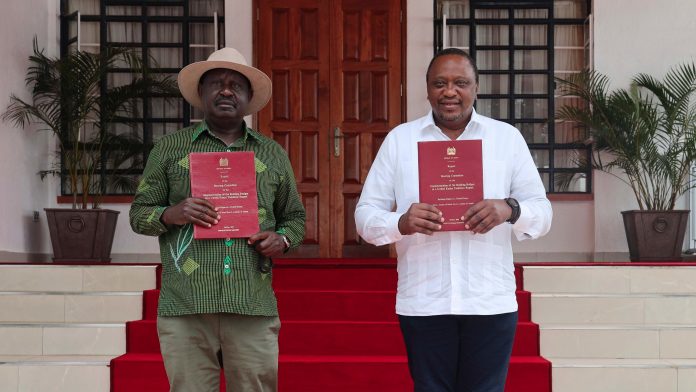The Building Bridges Initiative (BBI) taskforce has handed over the much anticipated BBI report to both president Uhuru Kenyatta and ODM party leader Raila Odinga. While receiving the report at Kisii State Lodge, the two principals (Raila and Uhuru) heaped praises at the report stating that it was the only way out for a united Kenya.
The report recommends a Constitutional amendment that would see reintroduction of the Office of the Prime Minister. This will however require a referendum to endorse the proposals.
The report states that under Article 151 of the reviewed Constitution, the Office of the Prime Minister shall exist.
Functions of Prime Minister as proposed by BBI
The premier will be appointed by the President, if the proposal is adopted. Under the new Supreme Law, the PM would have the following functions:
- Be the leader of government business in the National Assembly;
- Oversee the legislative agenda in the National Assembly on behalf of government;
- Supervise the execution of the functions of ministries and government departments;
- Chair cabinet committee meetings as assigned by the President;
- Assign any of the functions of the Office to the Deputy Prime Ministers; and
- Perform any other duty assigned by the President or conferred by legislation.
The President is required by the proposed Law to appoint a Prime Minister within seven days after the Head of State assumes office. The Law also states that should a vacancy occur in the Office of the Prime Minister, the Head of State should fill that vacancy within seven days after the seat falls vacant.
“A person is eligible to be nominated as the Prime Minister if the person is a member of the National Assembly who is the leader of the majority party or coalition of parties in the National Assembly,” says the proposed Law.
“Within seven days of the Speaker receiving a nomination from the President, the Speaker shall call a vote in the National Assembly to confirm the appointment of the person proposed by the President.
“A vote under clause (3) passes if it is supported by more than half of all the members of the National Assembly. Where the National Assembly fails to confirm the appointment of a person nominated by the President, the largest party or coalition of parties shall within seven days of rejection of a nominee, designate another member to be the party leader in the National Assembly and clauses (1), (2) and (3) shall apply.”
“If the National Assembly fails to confirm the appointment of the person proposed under clause (5), the President shall appoint a member who, in the President’s opinion, is able to command the confidence of the National Assembly.”
A vacancy in the Office of the Prime Minister arises under the following circumstances:
- Is dismissed by the President;
- Ceases to be a member of the National Assembly in accordance with Article 103;
- Resigns from office in writing addressed to the President; or
- Is impeached from office in accordance with this Article.
Impeachment of the Prime Minister
The proposed Law states that the process of impeaching the premier begins when “a member of the National Assembly, supported by at least one-quarter of all members proposed a motion of no confidence in the Prime Minister.”
“If the National Assembly, by a resolution supported by more than half of all members pass the motion of no confidence in the Prime Minister, the Prime Minister ceases to hold office,” says the proposed Law.
Deputy Prime Ministers
The premier will be deputised by two Deputy Prime Ministers appointed by the President, per the proposed Law. The Deputy PMs will be picked from Cabinet ministers.
The functions of the Deputy PM include:
- Deputising for the Prime Minister in the execution of the Prime Minister’s functions; and
- Performing any other function the Prime Minister may assign.
The Office of the Deputy Prime Minister becomes vacant if the person:
- Is dismissed by the President;
- Ceases to be a member of Parliament under Article 103;
- Ceases to be a Cabinet Minister or resigns in writing addressed to the President.


